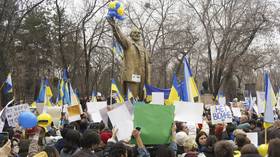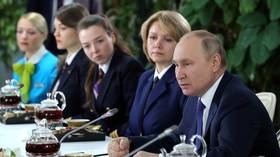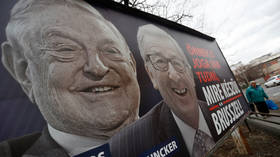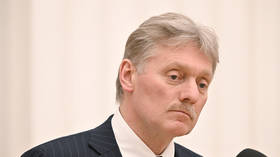How Russia’s neighbors view the war in Ukraine

A new wave of anti-war protests has swept through Kazakhstan. The activists blame Russia for aggression in Ukraine and compare President Vladimir Putin to the former Nazi German dictator Adolf Hitler. Meanwhile, Ukraine has recalled its ambassador to Kyrgyzstan, because Kiev has decided that the country supports the Russian military operation in Ukraine.
Of course, several forces are at work in the political and information space, many of them trying to undermine support for Russia in Central Asia.
Kyrgyzstan’s President Sadyr Japarov did express support for Russia’s actions in Ukraine in a phone conversation with President Vladimir Putin on February 26. The official record stated, “Sadyr Japarov emphasized Kiev’s responsibility for the failure of the Minsk agreements and expressed support for Russia’s decisive actions aimed at defending the Donbass people.”
The message is clear, and Japarov believes that the reason Moscow attacked Ukraine was the failure to implement the Minsk agreements, signed by Russia, Ukraine and the OSCE in 2014 in an attempt to end the war. He welcomed Russia’s recognition of the Donetsk and Luhansk People’s Republics as independent states as “possibly the last measure that had to be taken in order to defend the people” and “Moscow’s sovereign right.”
According to media reports, Uzbekistan’s President Shavkat Mirziyoyev also said that he “understood” Russia’s actions in Ukraine during his talks with Putin. The president’s press office didn’t deny the fact that such statements had been made at the top level meeting, but refused to give any further information, claiming that the republic’s position was “balanced and neutral.”
Kazakhstan’s President Kassym-Jomart Tokayev was very careful with his assessments – he had been a career diplomat for many years after all. He didn’t openly support Moscow, but in his statement, he reiterated the position of the Russian Foreign Ministry, “We are staying true to the indivisible Eurasian security principle.”
Tokayev also criticized Ukraine’s refusal to follow through on the Minsk agreements, which resulted in the military operation, “The Minsk agreements remained on paper, and this led to the military action in Ukraine.” (In early February, Ukrainian President Volodymyr Zelensky claimed that he disagreed with some of the provisions in the document).
The US is clearly involved in the efforts to undermine support for Moscow in the region. On February 28, the State Department held a special conference with these countries, where some very strong anti-Russia statements were made. Moscow’s actions were labeled as a “premeditated and unfounded invasion.”
Not just presidents
Pro-Russian statements made by the leaders of Central Asian states reflect the views of political, media, and professional elites, which in turn impacts foreign policy.
Soon after the ambassador was recalled, Akipress, the republic’s largest news agency, published an article by professor Jumagul Saadanbekov, the former president of the national diplomatic academy and ambassador to Ukraine, who is one of the leading experts on foreign policy in Kyrgyzstan.
In his article, Saadanbekov outlined Bishkek’s stance on the Ukrainian crisis, saying that, “In March 2021, Ukraine adopted a new military strategy. This document is almost entirely focused on a standoff with Russia and aims to drag the US and the West into a conflict with Russia. It envisages setting up underground terrorist organizations in Crimea and the Donbass, while the international community supports Ukraine, including in the military sense, in its geopolitical showdown with Russia. It’s clear that this could only mean preparation for military action against Russia. And so the Washington-led Ukraine simply forced Russia to start this war.”
Some people’s opinion on the Ukrainian crisis is formed through personal connections. Marina Lapenko, a visiting professor at one of the leading schools in Kazakhstan – the Eurasian National University – posted a letter that her little niece from the Donbass sent her (with original spelling and punctuation): “A war started here Grandpa left and they won’t let him come back because there is fighting everywhere we haven’t been to school for ages … Maybe we’ll join Russia soon and the war will be over. How are you?”
“We’ll work on her Russian when we have peace and we’ll finally be able to talk normally. I will be able to come back and visit Grandma’s grave,” Lapenko added.
Prominent Uzbek political analyst and head of the Ma’No research center Bakhtiyor Ergashev said that he sees the Ukrainian regime as an adversary and supports Russia. “I am descended from two WWII soldiers – both my grandfathers fought for the Red Army. They defended Stalingrad and captured Vienna and Konigsberg. So for me, a regime that renamed Ukrainian city streets after fascists and collaborators – Bandera, Shukhevich, who by the way was a hauptmann of the German Waffen SS Galicia Division, and so on – is, as they like to say in America, an existential enemy,” he said.
Former energy minister of Kyrgyzstan Rasul Umbetaliyev also called for determination to fight Ukrainian nationalists, saying, “The last and the most decisive drop was Zelensky’s statement at the Munich Conference on February 20, when he talked about creating a nuclear weapon … The special operation needs to be brought to a successful conclusion, i.e. the absolute capitulation of the Nazi regime, the transfer of power to the people and a tribunal to judge Zelensky for genocide.”
Kyrgyz opposition figure Irina Karamushkina also chimed in, joining an online debate on what’s going on in Ukraine. She stressed that Russia is not fighting Ukraine, but the radical regime there: “It was not Ukraine that was attacked – it was the Nazi authorities who ban the Russian language (even though more than 40% Russian speakers live there) and who destroy the memory about the heroes that fought German fascism, the heroes of the Great Patriotic War. How is that OK? And what will come next?”
Pro and contra
Still, there is a different sentiment going around in Central Asia regarding Russia’s operation in Ukraine. Just a few hours after it began, the Oyan, Qazaqstan movement organized a demonstration near the Russian consulate building. A small number of protesters had a Ukrainian flag and posters with slogans in English and Ukrainian.
The activists also said they condemn Russia and are starting a fundraising campaign for the Kiev regime.
The regional media, however, pointed out that all anti-Russian campaigners are somehow connected to the US, NATO countries, or Ukraine. Oyan, Qazaqstan was established in 2019 by a group of employees and grantees of the American Soros Foundation, an organization created by Hungarian billionaire George Soros, whose money were also involved in Ukraine.
Dimash Alzhanov, the leader of the Oyan, Qazaqstan movement, is a former employee of America’s National Democratic Institute, which is recognized in Russia as an undesirable organization. In 2014, he visited Ukraine as a member of an NDI delegation headed by Madeleine Albright. According to information from Ukrainian databases, he has a business in Kiev, and, according to some indications, dual citizenship with Ukrainian.
In 2021, vlast.kz, a website that covers the movement’s anti-Russian activities, received a grant in the amount of $230,000 from the National Endowment for Democracy (NED), which is controlled by the US government. Furthermore, the publication’s general director, Vyacheslav Abramov, is a member of the Board of Trustees of the American Soros Foundation in Kazakhstan.
NED also gave a grant to Bakhytzhan Toregozheva, a member of the anti-Russian initiative group, and her foundation, Ar Rukh Hak. Dosym Satpayev, another organizer of the campaign to defend the Ukrainian government, carries out projects with the support of Germany’s Ebert Foundation.
Anti-Russian activities and support for Ukrainian nationalists have led to sharp criticism in the region. Political analyst Bakhtiyor Ergashev called speeches in defense of the Kievan authorities hypocritical: “I am surprised by this hypocrisy. Listen, you fans of selectively compassionate hype-mongering: Where were you with your crocodile tears when they beat people with iron rods and burned their bodies at the House of Trade Unions in Odessa in May of 2014?”
Ergashev was referring to the brutal massacre of 48 people protesting against ukrainian Euromaidan in Odessa on May 2, 2014. Most of the victims were blocked in the House of Trade Unions building and burned alive. Odessa Governor Vladimir Nemirovsky called the events legitimate “actions of Odessa residents aimed at neutralizing and detaining armed terrorists.”
After this statement, Ergashev wrote on social networks that he had received threats from Kazakh nationalists through messengers. However, his position was also supported in Kazakhstan.
For example, journalist Danara Kurmanova from Uralsk reminded those who condemn the military operation in Ukraine about the victims of Ukrainian nationalists: “Peace needs to go both ways. I had really hoped there would be a massive cry for this after the appearance of the Nazis. After people were burned to death in Odessa in May of 2014. And when someone shouts ‘No to war!’ today, you need to remember that others have been saying ‘No’ for 8 years in a row now. That the Alley of Angels in Donbass appeared for a reason. But, until now, everyone pretended it didn’t exist.”
The Alley of Angels is the name of a memorial in Donetsk that honors the 149 people killed in artillery shellings by the Ukrainian army. Now, the Donetsk military is bringing captured Ukrainian soldiers to this memorial to show them the consequences of their troops’ punitive actions.
Attempts to organize anti-Russian activities in Kyrgyzstan also provoked protests by local public figures. One Kyrgyz politician, Azamat Bayamanov, reproached local NGOs for passing off their position as that of Kyrgyz society: “Who gave them the right to speak on behalf of all Kyrgyzstanis? You should have said that your NGO is with Ukraine. That would be correct!”
The head of the Tilekmat Ake Foundation, Tilek Usupov, even suggested passing a law recognizing ‘agents of foreign influence’ to identify those connected with pro-Ukrainian activities organized by non-governmental bodies. Kyrgyzstan has already adopted a law requiring the disclosure of foreign sources of NGO funding, but the ‘foreign agent’ concept has not yet been introduced in the republic’s legislation.
The Battle for Central Asia
After the start of Russia’s military operation in Ukraine, a fierce information and psychological war began, aimed at discrediting Moscow’s policies in various countries and regions. Russian media has reported on similar operations against Russia conducted by the Ukrainian Army using social networks.
However, we are witnessing a similar struggle in Central Asia. The only difference is that the main lobbyist promoting the interests of the United States and NATO is the community associated with the region’s non-governmental organizations, which is weaker and less active in Russia.
The positions of many politicians, experts, and journalists show that there are also many supporters of Russia in the region, who have influenced the positions of the leaders of a number of regional states. From the above remarks, we can see that they know the history of the events in Ukraine and the Donbass very well, including the crimes committed by pro-Kiev forces against the civilian population, and largely base their opinions on them.
This is due to the fact that the proportion of people who speak Russian well is still high in the region: 73% in Kyrgyzstan and 79% in Kazakhstan. Consequently, they have access to information from Russian and Russian-speaking Ukrainian media, and don’t rely on news about the conflict coming from American and British correspondents, like people in many countries around the world. In addition, the kinship and friendly ties that have existed since Soviet times draw countries and peoples closer to each other, so people feel the troubles of their former compatriots more acutely.
The common memory of World War II and the fight against fascism in 1941-1945 creates a special emotional bond between the countries of the former USSR. The Immortal Regiment event, a march held on the anniversary of the victory, where people carry portraits of relatives who participated in the war, is very popular in Central Asia. In 2019, on the eve of the pandemic before the ban on mass events, at least 240,000 people in the region took part.
Because of this collective memory, people in post-Soviet countries perceive the revival of Nazi practices in modern Ukraine with great alarm. According to the UN, 13,000 people have perished in the Donbass as a result of the Ukrainian authorities’ punitive operations and massacres of those opposed to the Kiev regime, like the mass burning at the House of Trade Unions in Odessa.
As a result, ordinary citizens in the region and representatives of its political elite can better understand Russia and the peoples of the Donetsk and Lugansk Republics, at least on an emotional level.
















